- Home
- Don DeLillo
Cosmopolis Page 2
Cosmopolis Read online
Page 2
He glanced out the one-way window to his left. It took him a moment to understand that he knew the woman in the rear seat of the taxi that lay adjacent. She was his wife of twenty-two days, Elise Shifrin, a poet who had right of blood to the fabulous Shifrin banking fortune of Europe and the world.
He coded a word to Torval up front. Then he stepped into the street and tapped on the taxi window. She smiled up at him, surprised. She was in her mid-twenties, with an etched delicacy of feature and large and artless eyes. Her beauty had an element of remoteness. This was intriguing but maybe not. Her head rode slightly forward on a slender length of neck. She had an unexpected laugh, a little weary and experienced, and he liked the way she put a finger to her lips when she wanted to be thoughtful. Her poetry was shit.
She slid over and he got in next to her. The horns subsided and resumed in ritualistic cycles. Then the taxi shot diagonally across the intersection to a point just west of Second Avenue, where it reached another impasse, with Torval jogging hot behind.
"Where's your car?"
"We can't seem to find it," she said. "I'd offer you a ride."
"I couldn't. Absolutely. I know you work en route. And I like taxis. I was never good at geography and I learn things by asking the drivers where they come from."
"They come from horror and despair."
"Yes, exactly. One learns about the countries where unrest is occurring by riding the taxis here."
"I haven't seen you in a while. I looked for you this morning.
He took off his sunglasses, for effect. She gazed into his face. She looked steadily, with fixed attention. "Your eyes are blue," she said.
He lifted her hand and held it to his face, smelling and licking. The Sikh at the wheel was missing a finger. Eric regarded the stub, impressive, a serious thing, a body ruin that carried history and pain.
"Eat breakfast yet?"
"No," she said.
"Good. I'm hungry for something thick and chewy."
"You never told me you were blue-eyed."
He heard the static in her laugh. He bit her thumb knuckle and opened the door and they stepped across the sidewalk to the coffee shop near the corner.
He sat with his back to the wall, watching Torval position himself near the front door, where he had a broad view of the room. The place was crowded. He heard stray words in French and Somali seeping through the ambient noise. That was the disposition of this end of 47th Street. Dark women in ivory robes walking in the river wind toward the UN secretariat. Apartment towers called Mole and Octavia. There were Irish nannies pushing strollers in the parks. And Elise of course, Swiss or something, sitting across the table.
"What are we going to talk about?" she said.
He sat before a plate of pancakes and sausages, waiting for the square of butter to melt and run so he could use his fork to swirl it into the torpid syrup and then watch the marks made by the tines slowly fold into the soak. He realized her question was serious.
"We want a heliport on the roof. I've acquired airrights but still need to get a zoning variance. Don't you want to eat?"
It seemed, the food, to make her draw back. Green tea and toast untouched before her.
"And a shooting range next to the elevator bank. Let's talk about us."
"You and I. We're here. So might as well."
"When are we going to have sex again?"
"We will. I promise," she said.
"We haven't in a while now."
"When I work, you see. The energy is precious."
"When you write."
"Yes."
"Where do you do this? I look for you, Elise."
He watched Torval move his lips thirty feet away. He was speaking into a mouthpiece concealed in his lapel. He wore an ear bud. The handset of his cell phone was belted under his jacket not far from his voice-activated firearm, Czech-made, another emblem of the international tenor of the district.
"I curl up somewhere. I've always done this. My mother used to send people to find me," she said. "Maids and gardeners combing the house and grounds. She thought I was dissolvable in water."
"I like your mother. You have your mother's breasts."
"Her breasts."
"Great stand-up tits," he said.
He ate quickly, inhaling his food. Then he ate her food. He thought he could feel the glucose entering his cells, fueling the body's other appetites. He nodded to the owner of the place, a Greek from Samos, who waved from the counter. He liked to come here because Torval did not want him to.
"Tell me this. Where will you go now?" she said. "To a meeting somewhere? To your office? Where is your office? What do you do exactly?"
She peered at him over bridged hands, her smile in hiding.
"You know things. I think this is what you do," she said. "I think you're dedicated to knowing. I think you acquire information and turn it into something stupendous and awful. You're a dangerous person. Do you agree? A visionary."
He watched Torval bend a hand to the side of his head, listening to the person who was speaking into his ear bud. He knew these devices were already vestigial. They were degenerate structures. Maybe not the handgun just yet. But the word itself was lost in blowing mist.
He stood by the car, parked illegally, and listened to Torval.
"Report from the complex. There's a credible threat. Not to be dismissed. This means a ride crosstown."
"We've had numerous threats. All credible. I'm still standing here."
"Not a threat to your safety. To his."
"Who the fuck is his?"
"The president's. This means a ride crosstown does not happen unless we make a day of it, with cookies and milk."
He found that Torval's burly presence was a provocation. He was knotted and sloped. He had the body of a heavy lifter, appearing to stand and squat simultaneously. His bearing was one of blunt persuasion, with the earnest alertness that thickset men bring to a task. These were hostile incitements. They engaged Eric's sense of his own physical authority, his standards of force and brawn.
"Do people still shoot at presidents? I thought there were more stimulating targets," he said.
He looked for steady temperament in his security staff. Torval did not match the pattern. Times he was ironic and other times faintly disdainful of standard procedures. Then there was his head. There was something in the jut of his shaved head and the aberrant set of his eyes that carried an inference of abiding anger. His job was to be selective in his terms of confrontation, not hate a faceless world.
He'd noticed that Torval had stopped calling him Mr. Packer. He called him nothing now. This omission left a space in nature large enough for a man to walk through.
He realized Elise was gone. He'd forgotten to ask where she was headed.
"In the next block there are two haircutting salons. One, two," Torval said. "No need to go crosstown. The situation isn't stable."
People hurried past, the others of the street, endless anonymous, twenty-one lives per second, race-walking in their faces and pigments, sprays of fleetest being.
They were here to make the point that you did not have to look at them.
Michael Chin was in the jump seat now, his currency analyst, calmly modeling a certain sizable disquiet. "I know that smile, Michael."
"I think the yen. I mean there's reason to believe we may be leveraging too rashly"
"It's going to turn our way."
"Yes. I know. It always has."
"The rashness you think you see."
"What is happening doesn't chart."
"It charts. You have to search a little harder. Don't trust standard models. Think outside the limits. The yen is making a statement. Read it. Then leap."
"We are betting big-time here.
"I know that smile. I want to respect it. But the yen can't go any higher."
"We are borrowing enormous, enormous sums."
"Any assault on the borders of perception is going to seem rash at first."
"Eric, come on. We are speculating into the void."
"Your mother blamed the smile on your father. He blamed her. There's something deathly about it."
"I think we ought to adjust."
"She thought she'd have to enroll you in special counseling."
Chin had advanced degrees in mathematics and economics and was only a kid, still, with a gutterpunk stripe in his hair, a moody beet-root red.
The two men talked and made decisions. These were Eric's decisions, which Chin entered resentfully in his hand organizer and then synched with the system. The car was moving. Eric watched himself on the oval screen below the spycam, running his thumb along his chinline. The car stopped and moved and he realized queerly that he'd just placed his thumb on his chinline, a second or two after he'd seen it on-screen.
"Where is Shiner?"
"On his way to the airport."
"Why do we still have airports? Why are they called airports?"
"I know I can't answer these questions without losing your respect," Chin said.
"Shiner told me our network is secure."
"Then it is."
"Safe from penetration."
"He's the best there is at finding holes."
"Then why am I seeing things that haven't happened yet?
The floor of the limousine was Carrara marble, from the quarries where Michelangelo stood half a millennium ago, touching the tip of his finger to the starry white stone.
He looked at Chin, adrift in his jump seat, lost in rambling thought.
"How old are you?"
"Twenty-two. What? Twenty-two."
"You look younger. I was always younger than anyone around me. One day it began to change."
"I don't feel younger. I feel located totally nowhere. I think I'm ready to quit, basically, the business."
"Put a stick of gum in your mouth and try not to chew it. For someone your age, with your gifts, there's only one thing in the world worth pursuing professionally and intellectually. What is it, Michael? The interaction between technology and capital. The inseparability."
"High school was the last true challenge," Chin said.
The car drifted into gridlock on Third Avenue. The driver's standing orders were to advance into blocked intersections, not hang feebly back.
"There's a poem I read in which a rat becomes the unit of currency."
"Yes. That would be interesting," Chin said.
"Yes. That would impact the world economy."
"The name alone. Better than the dong or the kwacha."
"The name says everything."
"Yes. The rat," Chin said.
"Yes. The rat closed lower today against the euro."
"Yes. There is growing concern that the Russian rat will be devalued."
"White rats. Think about that."
"Yes. Pregnant rats."
"Yes. Major sell-off of pregnant Russian rats."
" Britain converts to the rat," Chin said.
"Yes. Joins trend to universal currency."
"Yes. U.S. establishes rat standard."
"Yes. Every U.S. dollar redeemable for rat."
"Dead rats."
"Yes. Stockpiling of dead rats called global health menace.
"How old are you?" Chin said. "Now that you're not younger than everyone else."
He looked past Chin toward streams of numbers running in opposite directions. He understood how much it meant to him, the roll and flip of data on a screen. He studied the figural diagrams that brought organic patterns into play, birdwing and chambered shell. It was shallow thinking to maintain that numbers and charts were the cold compression of unruly human energies, every sort of yearning and midnight sweat reduced to lucid units in the financial markets. In fact data itself was soulful and glowing, a dynamic aspect of the life process. This was the eloquence of alphabets and numeric systems, now fully realized in electronic form, in the zero-oneness of the world, the digital imperative that defined every breath of the planet's living billions. Here was the heave of the biosphere. Our bodies and oceans were here, knowable and whole.
The car began to move. He saw the first of the haircutting salons to his right, on the northwest corner, Filles et Garcons. He sensed Torval waiting, up front, for the order to stop the car.
He glimpsed the marquee of the second establishment, not far ahead, and spoke a coded phrase to a signal processor in the partition, the slide between the driver and rear cabin. This generated a command on one of the dashboard screens.
The car came to a stop in front of the apartment building that was situated between the two salons. He got out and went into the tunneled passage, not waiting for the doorman to shuffle to his phone. He entered the enclosed space of the courtyard, mentally naming what was in it, the shade-happy euonymus and lobelia, the dark-star coleus, the honey locust with its pinnate leaves and unsplit pods. He could not quite summon the Latin name of the tree but knew it would come to him within the hour or somewhere deep in the running lull of the next sleepless night.
He walked under a cross-vaulted arch of white latticework planted with climbing hydrangeas and then stepped into the building proper.
A minute later he was in her apartment.
She put a hand to his chest, self-dramatically, to determine he was here and real. Then they began to stumble and clutch, working toward the bedroom. They hit the doorpost and bounced. One of her shoes began to angle off but she could not shake free and he had to kick it away. He pressed her against the wall drawing, a minimalist grid executed over several weeks by two of the artist's adjutants working with measuring instruments and graphite pencils.
They did not get serious about undressing until they were finished making love.
"Was I expecting you?"
"Just passing by."
They stood on opposite sides of the bed, bending and flexing to remove final items of clothing.
"Thought you'd drop in, did you? That's nice. I'm glad. Been a while. I read about it, of course."
She lay prone now, head turned on the pillow, and watched him.
"Or did I see it on TV?"
"What?"
"What? The wedding. How strange you didn't tell me."
"Not so strange."
"Not so strange. Two great fortunes," she said. "Like one of the great arranged marriages of old empire Europe."
"Except I'm a world citizen with a New York pair of balls."
Hoisting his genitals in his hand. Then he lay on the bed on his back staring into a painted paper lamp suspended from the ceiling.
"How many billions together do you two represent?"
"She's a poet."
"Is that what she is? I thought she was a Shifrin."
"A little of both."
"So rich and crisp. Does she let you touch her personal parts?"
"You look gorgeous today."
"For someone who's forty-seven and finally understands what her problem is."
"What's that?"
"Life is too contemporary. How old is your consort? Never mind. I don't want to know Tell me to shut up. One more question first. Is she good in bed?"
"I don't know yet."
"That's the trouble with old money," she said. "Now tell me to shut up."
He placed a hand on her buttock. They lay a while in silence. She was a scorched blonde named Didi Fancher. "I know something you want to know." He said, "What?"
"There's a Rothko in private hands that I have privileged knowledge of. It is about to become available."
"You've seen it."
"Three or four years ago. Yes. And it is luminous." He said, "What about the chapel?"
"What about it?"
"I've been thinking about the chapel."
"You can't buy the goddamn chapel."
"How do you know? Contact the principals."
"I thought you'd be thrilled about the painting. One painting. You don't have an important Rothko. You've always wanted one. We've talked about this."
"How many paintin
gs in his chapel?"
"I don't know. Fourteen, fifteen."
"If they sell me the chapel, I'll keep it intact. Tell them."
"Keep it intact where?"
"In my apartment. There's sufficient space. I can make more space.
"But people need to see it."
"Let them buy it. Let them outbid me."
"Forgive the pissy way I say this. But the Rothko Chapel belongs to the world."
"It's mine if I buy it."
She reached back and slapped his hand off her ass.
He said, "How much do they want for it?"
"They don't want to sell the chapel. And I don't want to give you lessons in self-denial and social responsibility. Because I don't believe for a minute you're as crude as you sound."
"You'd believe it. You'd accept the way I think and act if I came from another culture. If I were a pygmy dictator," he said, "or a cocaine warlord. Someone from the fanatical tropics. You'd love it, wouldn't you? You'd cherish the excess, the monomania. Such people cause a delicious stir in other people. People such as you. But there has to be a separation. If they look and smell like you, it gets confusing."
He pushed his armpit toward her face.
"Here lies Didi. Trapped in all the old puritanisms." He rolled belly down and they lay close, hips and shoulders touching. He licked along the rim of her ear and put his face in her hair, rooting softly. He said, "How much?"
"What does it mean to spend money? A dollar. A million."
"For a painting?"
"For anything."
"I have two private elevators now One is programmed to play Satie's piano pieces and to move at one-quarter normal speed. This is right for Satie and this is the elevator I take when I'm in a certain, let's say, unsettled mood. Calms me, makes me whole."
"Who's the other elevator?"
"Brutha Fez."
"Who's that?"
"The Sufi rap star. You don't know this?"
"I miss things."
"Cost me major money and made me an enemy of the people, requisitioning that second elevator."
"Money for paintings. Money for anything. I had to learn how to understand money," she said. "I grew up comfortably. Took me a while to think about money and actually look at it. I began to look at it. Look closely at bills and coins. I learned how it felt to make money and spend it. It felt intensely satisfying. It helped me be a person. But I don't know what money is anymore."

 Great Jones Street (Contemporary American Fiction)
Great Jones Street (Contemporary American Fiction) Americana
Americana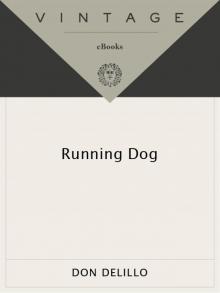 Running Dog
Running Dog Libra
Libra End Zone
End Zone Ratner's Star
Ratner's Star Underworld
Underworld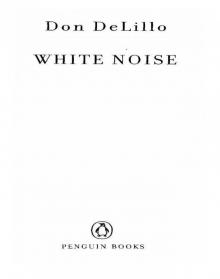 White Noise
White Noise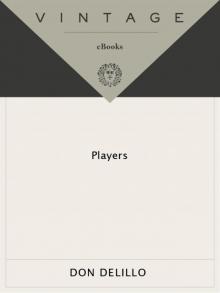 Players
Players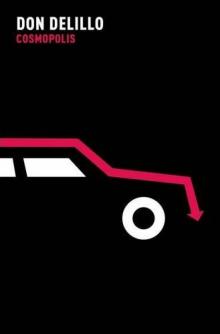 Cosmopolis
Cosmopolis The Silence
The Silence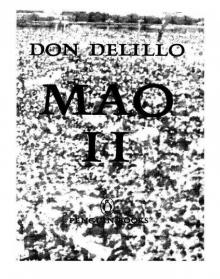 Mao II
Mao II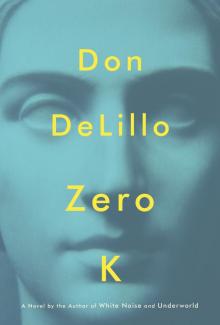 Zero K
Zero K Great Jones Street
Great Jones Street The Angel Esmeralda
The Angel Esmeralda The Names
The Names The Body Artist
The Body Artist Point Omega
Point Omega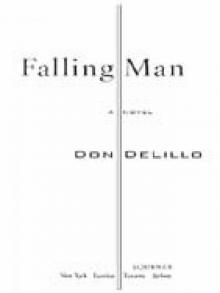 Falling Man
Falling Man